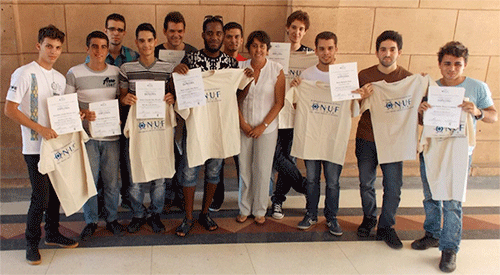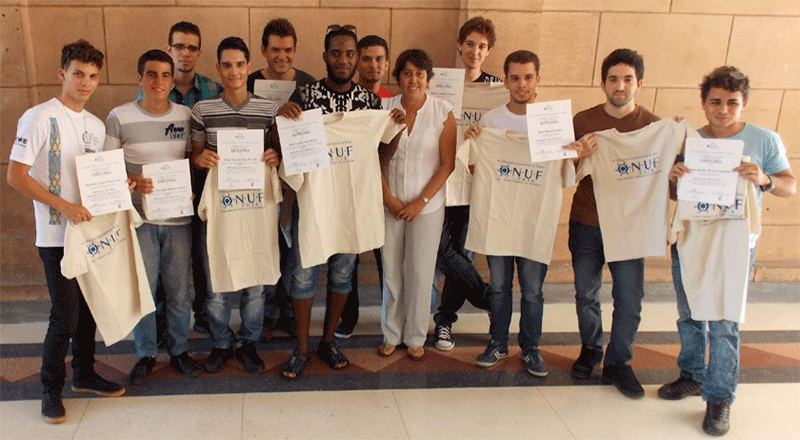Q&A: Sticking with Physics Against the Odds
In 1982 when María Sánchez Colina started her physics career at the University of Havana she had no idea of the struggles that lay ahead. Less than ten years later, the collapse of the Soviet Union launched a severe economic crisis in Cuba that profoundly affected the country’s scientific activity. But despite financial hardships and the accompanying challenges regarding travel, buying equipment, and accessing the Internet, her passion for physics didn’t falter. Physics spoke with Sánchez Colina, who now leads the Cuban Physical Society, to find out what it’s like to do research in such a difficult environment and hear about her efforts to steer Cuban science through these challenges. The interview was translated from a conversation in Spanish.
–Matteo Rini
Why did you decide to pursue a physics career in Cuba?
Physics felt like a natural choice to me, as many of my closest relatives worked in science. When I picked my field of study, physics was flourishing in Cuba. This was driven by the political relevance of physics in the cold-war era and by the Soviet Union’s steady economic support, which allowed the country to fund an ambitious research program. I fully expected to have a stable, exciting, and rewarding career as a physicist.
What is your field of research?
I study the physics of semiconductor devices such as semiconductor lasers, light-emitting diodes (LEDs), and, more recently, quantum-cascade lasers. My research focus is on thermal behavior: How does temperature affect device efficiency and stability? The question is relevant to many applications, from sensing to fiber-optic communications. Improving the thermal stability of green-light-emitting LEDs, could, for instance, solve the “green gap” problem—the lack of suitable green LEDs for boosting the efficiency of white lighting schemes.
What challenges have you faced working as a physicist in Cuba?
Finding funding for experiments and new machines became impossible when the Soviet Union’s support of Cuba ended in 1989. Much of my research equipment—such as argon lasers, an epitaxial system for growing thin semiconductor films, and cryogenic detectors—started to deteriorate and couldn’t be replaced. Even maintaining the buildings at our university became problematic and as a result we lost a number of laboratories. In addition, everyday life became very hard: the monthly salary I earn as a senior professor is about $40, which today is insufficient to support a family. And Cuba remains among the worst places on Earth for getting online: the Internet still can’t be accessed from private homes. (As a professor, I’m “privileged” to have a data quota of 500 MB/month.) All of this caused and continues to cause a steady emigration of young professionals from Cuba, a problem for the country and its physics community.
How have you handled these challenges?
Through creativity and willpower—the same way we keep our 1950s American cars running! After over a decade working as an experimentalist, I switched to numerical simulations as they are much cheaper to carry out. Agreements with the American Physical Society and the Abdus Salam International Centre for Theoretical Physics in Italy provide us with access to scientific publications that we otherwise can’t afford. Fellowships in Europe and Latin America make it possible to collaborate with foreign colleagues, and complete experiments in better-equipped laboratories, as well as provide the money we need to survive. I’m currently taking advantage of one such fellowship to carry out experiments at the Autonomous University of Madrid.
Why did you stay in Cuba?
It would be a lie to say that the thought of leaving Cuba never crossed my mind. But I stayed because I feel such a strong commitment to the people I work with, to keeping physics research running, and to ensuring that undergraduate and graduate students continue to receive an excellent education. I’m very proud to be one of only about five hundred physicists carrying out and publishing original research in Cuba.
As president of the Cuban Physical Society, what are you doing to improve the landscape of Cuban physics?
I’m pragmatic about what can be done. It won’t be possible to find more research funding any time soon. But we can still do important things with the little money we have. The society organizes physics Olympics to stimulate interest in the subject among students, and we host training courses for high-school teachers, led by physics professors, to improve science education. We also lobby politicians for important changes. For instance, we’re pushing for directors of research institutes and agencies to be elected by active researchers, rather than picked by politicians. And crucially, we need to convince the government to retain talent by ensuring that careers in science become an appealing option.
What is your dream for the future of Cuban physics?
A very simple one: an academic system that lets young students thrive and grow and provides researchers with sufficient money to support their families and pursue their research interests.
Know a physicist with a knack for explaining his or her research to others? Write to physics@aps.org. All interviews are edited for brevity and clarity.





